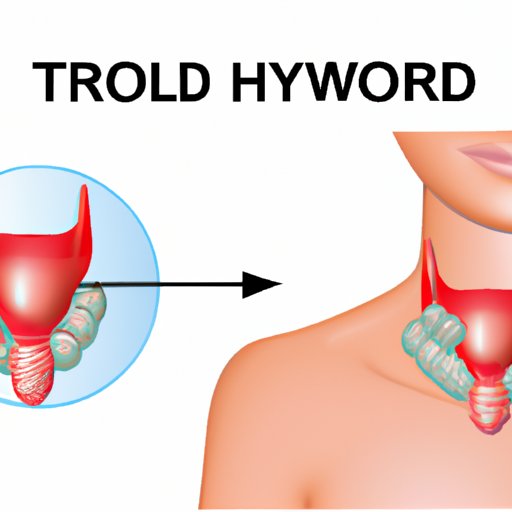Can You Live Without a Thyroid? Understanding the Function, Symptoms, Treatment, and Lifestyle Changes
The thyroid gland is an essential organ that secretes hormones that regulate metabolism, growth, and development. However, some people may face the possibility of living without a thyroid gland due to medical reasons. In this article, we will explore the function of the thyroid gland, symptoms of thyroid dysfunction, treatment options, lifestyle changes, and coping strategies for living without a thyroid gland. This article is for anyone who is interested in understanding the role of the thyroid gland, those who may be facing thyroid dysfunction or undergoing thyroidectomy surgery.
Explanation of the Thyroid Gland’s Function
The thyroid gland is a small, butterfly-shaped gland located in the neck, just below the Adam’s apple. The gland secretes hormones called thyroxine (T4) and triiodothyronine (T3), which regulate the body’s metabolic rate, affect heart rate, body weight, body temperature, and muscle strength.
The thyroid hormones also play a crucial role in the development of the brain and the nervous system. These hormones are produced in response to a hormone called thyroid-stimulating hormone (TSH), which is secreted by the pituitary gland in the brain. The hypothalamus also plays a role in regulating the thyroid gland’s activities by secreting thyrotropin-releasing hormone (TRH).
When the thyroid gland is functioning correctly, it produces the right amount of hormones required for the body’s normal functioning. However, when the thyroid gland is removed or damaged due to an underlying medical condition, a person may experience thyroid dysfunction.
Symptoms of Thyroid Dysfunction
Thyroid dysfunction occurs when the gland is producing too much or too little thyroid hormone. There are two primary types of thyroid disorders – hyperthyroidism and hypothyroidism.
Hyperthyroidism is a condition where the thyroid gland is overactive, producing too much thyroid hormone. Symptoms of hyperthyroidism may include increased heart rate, anxiety, tremors, weight loss, and diarrhea.
Hypothyroidism, on the other hand, is a condition where the thyroid gland is not producing enough thyroid hormone. Symptoms of hypothyroidism may include fatigue, weight gain, cold intolerance, depression, and dry skin.
Treatment for Thyroid Disorders
The treatment for thyroid disorders depends on the underlying condition. Hyperthyroidism may be treated with medications that reduce the amount of thyroid hormone produced by the thyroid gland, while hypothyroidism may be treated with medications that supplement thyroid hormone production.
In some cases, thyroidectomy surgery may be required to remove all or part of the thyroid gland. This may be necessary for conditions such as thyroid cancer, goiter, or hyperthyroidism that are not responsive to medication. After thyroidectomy surgery, patients may require lifelong hormone replacement therapy.
Lifestyle Changes for Thyroid Patients
Patients with thyroid disorders may need to make lifestyle changes to manage their symptoms effectively. Diet and exercise may play a crucial role in managing thyroid dysfunction in some cases.
The foods that a person eats may affect thyroid function. In some cases, eating a diet high in iodine, selenium, and zinc may help improve thyroid function. Foods that are rich in these minerals include shellfish, fish, nuts, and seeds.
Exercise may help improve metabolism and weight management in people with thyroid dysfunction. Regular exercise may also help improve mood and reduce stress, leading to better overall health.
Coping with Life Without a Thyroid
Living without a thyroid may seem daunting, but many people are able to lead healthy and productive lives after thyroidectomy surgery. However, there may be emotional and psychological challenges that some patients need to address.
One of the most significant challenges that patients face is the need for lifelong hormone replacement therapy. Adhering to a consistent hormone replacement regimen is vital to keeping a person’s metabolism and overall health on track.
Many people also experience changes in their appearance following thyroidectomy surgery, such as weight gain or a hoarse voice. These changes can affect a person’s self-esteem and body image. However, there are therapies and support groups available to help patients cope with these changes and manage their emotional wellbeing.
Conclusion
The thyroid gland is a crucial organ that plays a significant role in regulating metabolism, growth, and development. Thyroid dysfunction may affect a person’s overall health and wellbeing. However, with the right treatment and lifestyle changes, people with thyroid dysfunction can lead healthy and productive lives. If you suspect that you may have a thyroid disorder, seek medical advice from your healthcare provider.
